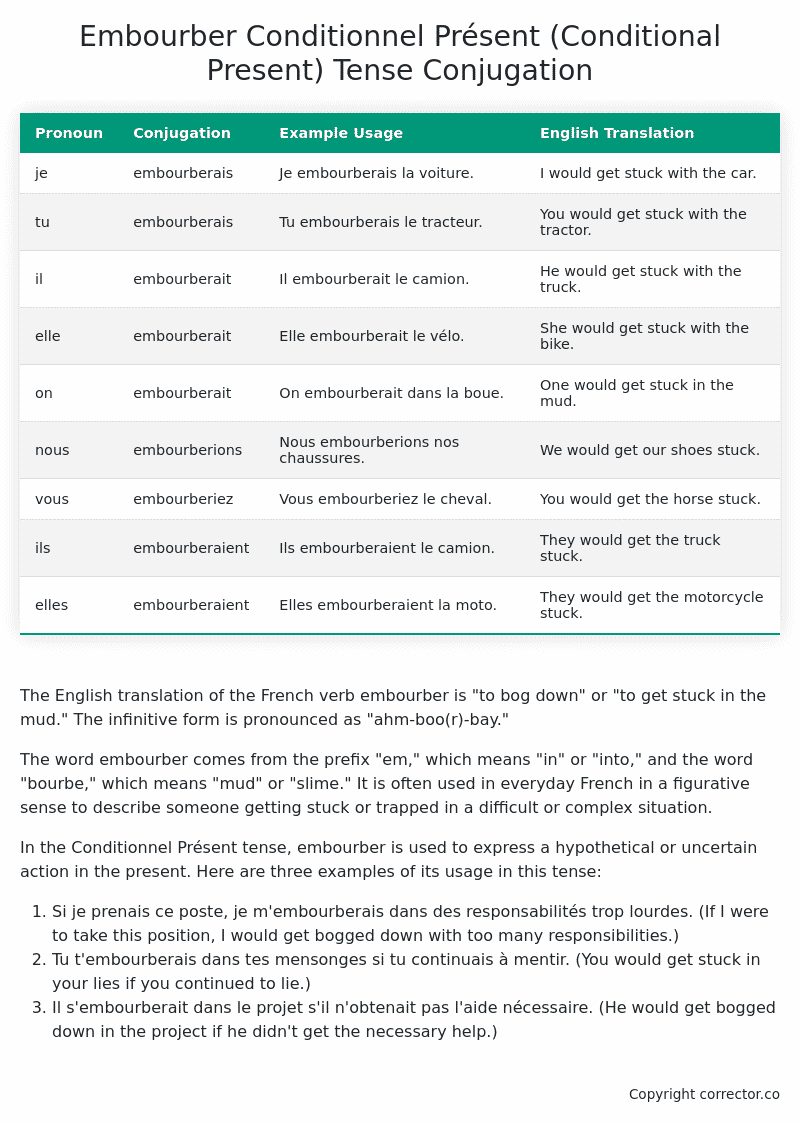Conditionnel Présent (Conditional Present) Tense Conjugation of the French Verb embourber
Introduction to the verb embourber
The English translation of the French verb embourber is “to bog down” or “to get stuck in the mud.” The infinitive form is pronounced as “ahm-boo(r)-bay.”
The word embourber comes from the prefix “em,” which means “in” or “into,” and the word “bourbe,” which means “mud” or “slime.” It is often used in everyday French in a figurative sense to describe someone getting stuck or trapped in a difficult or complex situation.
In the Conditionnel Présent tense, embourber is used to express a hypothetical or uncertain action in the present. Here are three examples of its usage in this tense:
- Si je prenais ce poste, je m’embourberais dans des responsabilités trop lourdes. (If I were to take this position, I would get bogged down with too many responsibilities.)
- Tu t’embourberais dans tes mensonges si tu continuais à mentir. (You would get stuck in your lies if you continued to lie.)
- Il s’embourberait dans le projet s’il n’obtenait pas l’aide nécessaire. (He would get bogged down in the project if he didn’t get the necessary help.)
Table of the Conditionnel Présent (Conditional Present) Tense Conjugation of embourber
| Pronoun | Conjugation | Example Usage | English Translation |
|---|---|---|---|
| je | embourberais | Je embourberais la voiture. | I would get stuck with the car. |
| tu | embourberais | Tu embourberais le tracteur. | You would get stuck with the tractor. |
| il | embourberait | Il embourberait le camion. | He would get stuck with the truck. |
| elle | embourberait | Elle embourberait le vélo. | She would get stuck with the bike. |
| on | embourberait | On embourberait dans la boue. | One would get stuck in the mud. |
| nous | embourberions | Nous embourberions nos chaussures. | We would get our shoes stuck. |
| vous | embourberiez | Vous embourberiez le cheval. | You would get the horse stuck. |
| ils | embourberaient | Ils embourberaient le camion. | They would get the truck stuck. |
| elles | embourberaient | Elles embourberaient la moto. | They would get the motorcycle stuck. |
Other Conjugations for Embourber.
Le Present (Present Tense) Conjugation of the French Verb embourber
Imparfait (Imperfect) Tense Conjugation of the French Verb embourber
Passé Simple (Simple Past) Tense Conjugation of the French Verb embourber
Passé Composé (Present Perfect) Tense Conjugation of the French Verb embourber
Futur Simple (Simple Future) Tense Conjugation of the French Verb embourber
Futur Proche (Near Future) Tense Conjugation of the French Verb embourber
Plus-que-parfait (Pluperfect) Tense Conjugation of the French Verb embourber
Passé Antérieur (Past Anterior) Tense Conjugation of the French Verb embourber
Futur Antérieur (Future Anterior) Tense Conjugation of the French Verb embourber
Subjonctif Présent (Subjunctive Present) Tense Conjugation of the French Verb embourber
Subjonctif Passé (Subjunctive Past) Tense Conjugation of the French Verb embourber
Subjonctif Imparfait (Subjunctive Imperfect) Tense Conjugation of the French Verb embourber
Subjonctif Plus-que-parfait (Subjunctive Pluperfect) Tense Conjugation of the French Verb embourber
Conditionnel Présent (Conditional Present) Tense Conjugation of the French Verb embourber (this article)
Conditionnel Passé (Conditional Past) Tense Conjugation of the French Verb embourber
L’impératif Présent (Imperative Present) Tense Conjugation of the French Verb embourber
L’infinitif Présent (Infinitive Present) Tense Conjugation of the French Verb embourber
Struggling with French verbs or the language in general? Why not use our free French Grammar Checker – no registration required!
Get a FREE Download Study Sheet of this Conjugation 🔥
Simply right click the image below, click “save image” and get your free reference for the embourber Conditionnel Présent tense conjugation!

Embourber – About the French Conditionnel Présent (Conditional Present) Tense
Formation
Common Everyday Usage Patterns
Expressing Polite Requests
Expressing Hypothetical Situations
Expressing Doubt or Uncertainty
Interactions with Other Tenses
Present Tense
Past Tense
Future Tense
Conditional Perfect
Summary
Want More?
I hope you enjoyed this article on the verb embourber. Still in a learning mood? Check out another TOTALLY random French verb conjugation!


